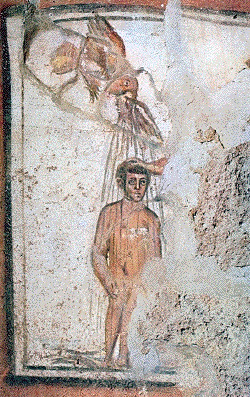 Image via Wikipedia
Image via Wikipedia
It is amazing to me how some people understand this. It really revolves around what it means to "know Christ". Some reduce it to something trivial and idolatrous. For example, that it merely means to accept a list of creeds or propositions about distant historical events with an intellectual and verbal assent and then perform the proper magic ritual with the right words and actions and objects. Ritual and formal tradition are not trivial, but they can obstruct a clear view of what matters. Christianity, Buddhism, etc are living traditions embodied in community. To see the Sangha is to see the Buddha, to see the Church is to see Christ. Going to a church, saying a "sinner's prayer", performing all the rites, etc, is no guarantee that one has actually really fully met or completely understood Jesus. And some who have met him do not know him very well.
Still I have have known some people who think that if you hear the word Jesus and don't "believe" (in terms of giving intellectual assent) you will be damned. Others think if you have heard the basic story of the Gospels and don't "believe", you will be damned. Others believe if you have gone to a church, such as a Protestant congregation, and have sat and listened and sang along etc, and you don't or stop "believing", you are damned. And still others say that if you pray a sinner's prayer and get baptized and then still don't or stop believing, you are either "once saved always saved" or because of disbelief you are damned.
But do any of these things automatically constitute "knowing", really knowing, Jesus. There are many people who go through such motions who seem to have little or no spiritual depth or the fruits of grace, while others who used to got to a church but have stopped attending demonstrate extraordinary depths of kindness, charity, etc. I am not advocating judging the hearts of others, but it seems to me that externals do not always tell the true story of the heart. No matter how many prayers one has prayed, or how many services one has attended.
The idea of being doomed makes sense if we are saying that someone has truly had their eyes opened, beyond mere intellectual assent, and are thus denying what they absolutely know to be true in their heart of hearts. To do so truly would be a painful, hellish experience, to knowingly try to cut oneself off from a union with the Source of their Being. This would come from a deluded state - not one of full awareness of who Christ is. It is like the teaching in Pure Land Buddhism that those committing certain offenses are excluded, yet none can be denied entry. The explanation is that eternity can be experienced in this life, but when in such a selfish, deluded state one cannot perceive/enter it.
Yet my experience with many ex-Christians is that they honestly do not feel such a conviction or that they are denying anything other than falsehoods. If that is true, then perhaps what they have rejected is a human construct, an idol in the image and language of Christ, that they correctly came to see as false and unworthy of their time. In that sense many of them would indeed be seeking the truth even though their search appears superficially to be leading them "away from" Jesus.
As for other traditions, it is always better to think bigger of God. If Christians believe God is the source of love and being and that Christ is in the heart of our ever-unfolding Creation, then all wisdom, compassion, etc must be of this source, whatever cultural wrapping it may appear in. In fact, trying to convert someone from a genuine and fruitful practice of a non-Christian path in which humility, wisdom and gratitude are being cultivated to a forfeit and immature vision of Christ can actually be harmful. If you can't see a kindred spirit of Christ expressed in the lives of people like the Dalai Lama, look harder.

![Reblog this post [with Zemanta]](http://img.zemanta.com/reblog_e.png?x-id=42902e6b-df64-418a-83a5-9b21cea3d1f5)
No comments:
Post a Comment
Hello! Thanks for leaving a comment.
Everything but spam and abusive comments are welcome. Logging in isn't necessary but if you don't then please "sign" at the end of your comment. You can choose to receive email notifications of new replies to this post for your convenience, and if you find it interesting don't forget to share it. Thanks!